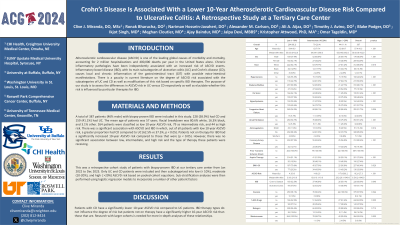Monday Poster Session
Category: IBD
P2658 - Crohn’s Disease Is Associated With a Lower 10-Year Atherosclerotic Cardiovascular Disease Risk Compared to Ulcerative Colitis: A Retrospective Study at a Tertiary Care Center
Monday, October 28, 2024
10:30 AM - 4:00 PM ET
Location: Exhibit Hall E


Clive J. Miranda, DO, MSc
CHI Health Creighton University Medical Center
Omaha, NE
Presenting Author(s)
Clive J. Miranda, DO, MSc1, Ronak Bharucha, DO2, Nariman Hossein-Javaheri, DO3, Alexander M. Carlson, DO3, Ali A. Aijaz, DO3, Timothy J. Avino, DO3, Blake Podger, DO3, Ikjot Singh, MD3, Meghan Cloutier, MD3, Ajay Baindur, MD3, Jalpa Devi, MBBS4, Kristopher Attwood, PhD, MA5, Omar Tageldin, MD6
1CHI Health Creighton University Medical Center, Omaha, NE; 2SUNY Upstate Medical University Hospital, Syracuse, NY; 3University at Buffalo, Buffalo, NY; 4Washington University School of Medicine in St. Louis / Barnes-Jewish Hospital, St. Louis, MO; 5Roswell Park Cancer Institute, Buffalo, NY; 6Albany Medical Center, Albany, NY
Introduction: Atherosclerotic cardiovascular disease (ASCVD) is one of the leading global causes of morbidity and mortality, accounting for 2 million hospitalizations and 400,000 deaths per year in the United States alone. Chronic inflammatory pathologies have been independently associated with an increased risk of ASCVD events. Inflammatory bowel disease (IBD), with its main subcategories of ulcerative colitis (UC) and Crohn’s disease (CD), causes local and chronic inflammation of the gastrointestinal tract (GIT) with possible extra-intestinal manifestations. There is a paucity in current literature on the degree of ASCVD risk associated with the subcategories of UC and CD as well as modifications of this risk based on specific IBD therapies. The purpose of our study is to assess the differences in ASCVD risk in UC versus CD respectively as well as elucidate whether this risk is influenced by particular therapies for IBD.
Methods: This was a retrospective cohort study of patients with biopsy-proven IBD at our tertiary care center from January 2022 to December 2023. Only UC and CD patients were included and then subcategorized into low (< 10%), moderate (10-20%), and high ( >20%) ASCVD risk based on pooled-cohort equations. Sub-stratification analyses were then performed using logistic regression models to incorporate a number of other patient factors (e.g. race, sex, therapy type, etc.)
Results: A total of 387 patients (46% male) with biopsy-proven IBD were included in this study. 228 (58.9%) had CD and 159 (41.1%) had UC. The mean age of patients was 57 years. Racial breakdown was 80.6% white, 16.3% black, and 3.1% other. 264 patients were classified as low 10-year ASCVD risk, 79 as intermediate risk, and 44 as high risk. There was a significant association with ASCVD and IBD in which, out of all patients with low 10-year ASCVD risk, a greater proportion had CD compared to UC (62.5% vs 37.5%, p < 0.05). Patients not on therapy for IBD had a significantly increased 10-year ASCVD risk compared to those that were (p < 0.05). However, there was no significant association between low, intermediate, and high risk and the type of therapy these patients were receiving.
Discussion: Patients with CD have a significantly lower 10-year ASCVD risk compared to UC patients. IBD therapy types do not influence the degree of risk but patients not on therapy have a significantly higher 10-year ASCVD risk than those that are. Research with larger cohorts is needed for more in-depth analyses of these relationships.
Note: The table for this abstract can be viewed in the ePoster Gallery section of the ACG 2024 ePoster Site or in The American Journal of Gastroenterology's abstract supplement issue, both of which will be available starting October 27, 2024.
Disclosures:
Clive J. Miranda, DO, MSc1, Ronak Bharucha, DO2, Nariman Hossein-Javaheri, DO3, Alexander M. Carlson, DO3, Ali A. Aijaz, DO3, Timothy J. Avino, DO3, Blake Podger, DO3, Ikjot Singh, MD3, Meghan Cloutier, MD3, Ajay Baindur, MD3, Jalpa Devi, MBBS4, Kristopher Attwood, PhD, MA5, Omar Tageldin, MD6. P2658 - Crohn’s Disease Is Associated With a Lower 10-Year Atherosclerotic Cardiovascular Disease Risk Compared to Ulcerative Colitis: A Retrospective Study at a Tertiary Care Center, ACG 2024 Annual Scientific Meeting Abstracts. Philadelphia, PA: American College of Gastroenterology.
1CHI Health Creighton University Medical Center, Omaha, NE; 2SUNY Upstate Medical University Hospital, Syracuse, NY; 3University at Buffalo, Buffalo, NY; 4Washington University School of Medicine in St. Louis / Barnes-Jewish Hospital, St. Louis, MO; 5Roswell Park Cancer Institute, Buffalo, NY; 6Albany Medical Center, Albany, NY
Introduction: Atherosclerotic cardiovascular disease (ASCVD) is one of the leading global causes of morbidity and mortality, accounting for 2 million hospitalizations and 400,000 deaths per year in the United States alone. Chronic inflammatory pathologies have been independently associated with an increased risk of ASCVD events. Inflammatory bowel disease (IBD), with its main subcategories of ulcerative colitis (UC) and Crohn’s disease (CD), causes local and chronic inflammation of the gastrointestinal tract (GIT) with possible extra-intestinal manifestations. There is a paucity in current literature on the degree of ASCVD risk associated with the subcategories of UC and CD as well as modifications of this risk based on specific IBD therapies. The purpose of our study is to assess the differences in ASCVD risk in UC versus CD respectively as well as elucidate whether this risk is influenced by particular therapies for IBD.
Methods: This was a retrospective cohort study of patients with biopsy-proven IBD at our tertiary care center from January 2022 to December 2023. Only UC and CD patients were included and then subcategorized into low (< 10%), moderate (10-20%), and high ( >20%) ASCVD risk based on pooled-cohort equations. Sub-stratification analyses were then performed using logistic regression models to incorporate a number of other patient factors (e.g. race, sex, therapy type, etc.)
Results: A total of 387 patients (46% male) with biopsy-proven IBD were included in this study. 228 (58.9%) had CD and 159 (41.1%) had UC. The mean age of patients was 57 years. Racial breakdown was 80.6% white, 16.3% black, and 3.1% other. 264 patients were classified as low 10-year ASCVD risk, 79 as intermediate risk, and 44 as high risk. There was a significant association with ASCVD and IBD in which, out of all patients with low 10-year ASCVD risk, a greater proportion had CD compared to UC (62.5% vs 37.5%, p < 0.05). Patients not on therapy for IBD had a significantly increased 10-year ASCVD risk compared to those that were (p < 0.05). However, there was no significant association between low, intermediate, and high risk and the type of therapy these patients were receiving.
Discussion: Patients with CD have a significantly lower 10-year ASCVD risk compared to UC patients. IBD therapy types do not influence the degree of risk but patients not on therapy have a significantly higher 10-year ASCVD risk than those that are. Research with larger cohorts is needed for more in-depth analyses of these relationships.
Note: The table for this abstract can be viewed in the ePoster Gallery section of the ACG 2024 ePoster Site or in The American Journal of Gastroenterology's abstract supplement issue, both of which will be available starting October 27, 2024.
Disclosures:
Clive Miranda indicated no relevant financial relationships.
Ronak Bharucha indicated no relevant financial relationships.
Nariman Hossein-Javaheri indicated no relevant financial relationships.
Alexander Carlson indicated no relevant financial relationships.
Ali Aijaz indicated no relevant financial relationships.
Timothy Avino indicated no relevant financial relationships.
Blake Podger indicated no relevant financial relationships.
Ikjot Singh indicated no relevant financial relationships.
Meghan Cloutier indicated no relevant financial relationships.
Ajay Baindur indicated no relevant financial relationships.
Jalpa Devi indicated no relevant financial relationships.
Kristopher Attwood indicated no relevant financial relationships.
Omar Tageldin indicated no relevant financial relationships.
Clive J. Miranda, DO, MSc1, Ronak Bharucha, DO2, Nariman Hossein-Javaheri, DO3, Alexander M. Carlson, DO3, Ali A. Aijaz, DO3, Timothy J. Avino, DO3, Blake Podger, DO3, Ikjot Singh, MD3, Meghan Cloutier, MD3, Ajay Baindur, MD3, Jalpa Devi, MBBS4, Kristopher Attwood, PhD, MA5, Omar Tageldin, MD6. P2658 - Crohn’s Disease Is Associated With a Lower 10-Year Atherosclerotic Cardiovascular Disease Risk Compared to Ulcerative Colitis: A Retrospective Study at a Tertiary Care Center, ACG 2024 Annual Scientific Meeting Abstracts. Philadelphia, PA: American College of Gastroenterology.
